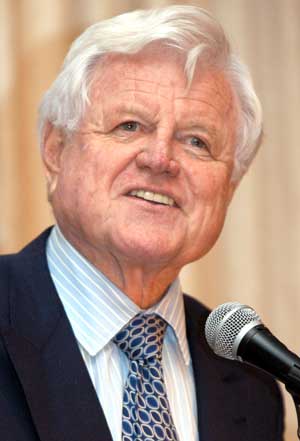There is added moral authority when someone who hasn’t had to struggle sounds a call to help those less privileged.
Beyond mere noblesse-oblige, Teddy Kennedy became a leading voice of ‘liberal’ ideology, with an emphasis on equality and innate justice best expressed in the civil rights movement of the 1960s — but applied far wider than that.

Teddy Kennedy RIP
The ’cause of my life’ Kennedy identified as universal health care is much more than a mere struggle for power or influence.
Such reform was (and is) opposed by fair means and foul by unimaginably wealthy vested interests in the health insurance industry. It is noisily opposed by such fat-cats — and their media lackeys who care not-a-jot for the less-advantaged except for what they can scoop out of them.
These cold-hearted interests see it as appropriate to leave the poor ‘without cover’ — and therefore at the mercy of some who, as my old PE teacher Jack McManus once colourfully said, ‘wouldn’t give you the steam off their piss’.
They are Tories in the worst meaning of the word: dedicated to protecting existing privilege — in this case to resisting health care reform — which they characterise as a scary ‘socialist’ attempt to wrest control of the billions spent on healthcare from them to someone else.
Like the thought-leaders of his generation, not least his brothers, Teddy Kennedy’s was a call for those who are rich to help lift up those who are poor, to give equal rights to all, to emphasise our reliance on each other, to remind us of the brotherhood of mankind.
Such ideals are unfashionable to many now. We live with the aftermath of the toxic and corrosive ‘greed is good’ credo of the 1980s.
Reagan and Thatcher’s anti-government ideology (‘there is no such thing as community society‘) attacked this sense of shared obligation. Instead, the political zeitgeist of those times preached ‘freedom’ and ‘self-reliance’ as the ultimate virtues, promoted a view of citizenry as atomised self-interested individuals (i.e. dog-eat-dog).
The warmongers in their camps demonstrated a kind of schizophrenic blind-spot when it came to armed forces and armament spending: It was perfectly OK to tax, borrow and spend to fatten the coffers of the arms makers and their shady dealers. Not so healthcare — which was equated with ‘big government’. Sleazy hypocrites.
Of course, in some quarters it is fashionable to hack at the Kennedy mystique. The legend of Camelot and the never-ending conspiracy theories that swirl like mist around the tragedies of the Kennedy family make for distraction, scuttlebutt and hateful ignorance. The politics of envy is nothing new. (If Irish Catholics know anything, they know what it is to face discrimination.) And, boy, could they fight! Even so, the viciousness some on the right have poured out through their talk shows and pulpits has to be seen to be believed. Just ghastly.
Were they perfect? No. So what?
Those of us who loved him, and take him to his rest today…
As for Teddy, I can never forget the waver in his voice when at Bobby Kennedy’s funeral he said:
My brother need not be idealized, or enlarged in death beyond what he was in life, to be remembered simply as a good and decent man, who saw wrong and tried to right it, saw suffering and tried to heal it, saw war and tried to stop it.
Those of us who loved him and who take him to his rest today, pray that what he was to us and what he wished for others will some day come to pass for all the world.
As he said many times, in many parts of this nation, to those he touched and who sought to touch him: “Some men see things as they are and say why.
I dream things that never were and say why not.“
RIP.


Wow. I just read a brilliant essay on Teddy Kennedy in the New York Times:
In Kennedy, the Last Roar of the New Deal Liberal – NYTimes.com